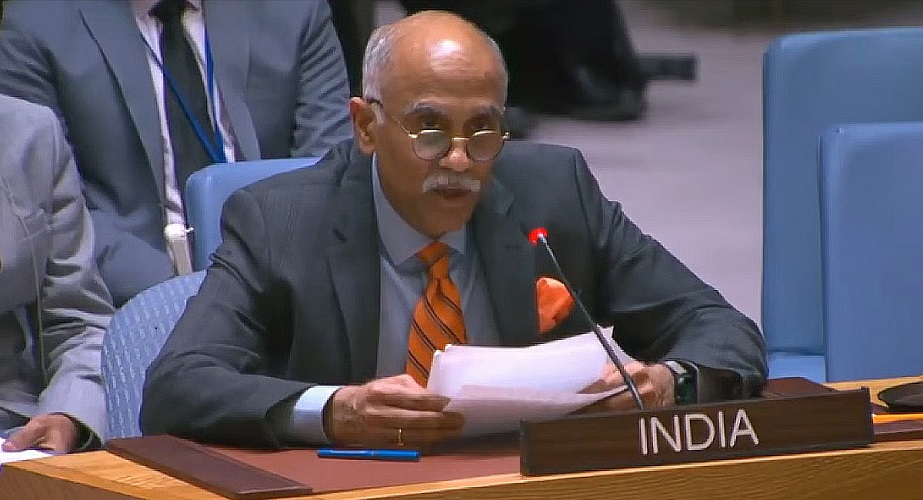UNITED NATIONS (TIP): India has reaffirmed its historic and continuing leadership in advancing the role of women in peacekeeping and global security, calling their full and equal participation “a necessity for lasting peace.” Speaking at the UN Security Council Open Debate on Women, Peace and Security (WPS) on Monday, October 6, Ambassador Parvathaneni Harish, India’s Permanent Representative to the United Nations, underscored that gender equality in peace operations has been integral to India’s approach to global peace for decades — long before the adoption of the landmark UN Security Council Resolution 1325 in 2000.
“India’s commitment to this principle predates the resolution by several decades,” Ambassador Harish said. “We recognized early that sustainable peace cannot be achieved without women.”
The debate, convened under the presidency of the Russian Federation, marked the 25th anniversary of Resolution 1325, which recognized women’s vital role in conflict prevention, peacekeeping, and post-conflict reconstruction.
Harish noted that as early as the 1960s, India deployed women medical officers to Congo, one of the first instances of female participation in UN peacekeeping. The country’s pioneering spirit, he said, reached a milestone in 2007, when India deployed the first-ever all-female Formed Police Unit (FPU) to Liberia — a mission that not only reduced crime and enhanced local security but also inspired Liberian women to join law enforcement and nation-building efforts. “This initiative was a game changer,” he said.
India’s leadership in advancing women’s participation has continued ever since. The appointment of Dr. Kiran Bedi, India’s first woman police officer, as the first female Police Adviser and head of the UN Police Division in 2003, was another historic step. Currently, more than 160 Indian women peacekeepers serve in UN missions worldwide, including all-women engagement teams in the Democratic Republic of Congo, Abyei (Sudan), and South Sudan.
Ambassador Harish highlighted the global recognition accorded to Indian women officers: Major Suman Gawani, who won the UN Military Gender Advocate Award in 2019 for her service in South Sudan, and Major Radhika Sen, honored in 2024 for her contributions in the Democratic Republic of Congo. “It is no longer a question of whether women can do peacekeeping,” Harish declared. “Rather, it is whether peacekeeping can do without women.”
He described women peacekeepers as “builders of trust, protectors of the vulnerable, and role models for change.” Citing External Affairs Minister Dr. S. Jaishankar, he added that women peacekeepers are true “messengers of peace.”
India has also become a global center for capacity-building in peacekeeping, especially for the Global South. The Centre for United Nations Peacekeeping (CUNPK) in New Delhi, established by the Indian Army, now trains over 12,000 troops annually. In 2016, it launched a flagship course for female military officers, training women from 39 countries in leadership, protection of civilians, and prevention of sexual exploitation and abuse. India has also deployed mobile training teams to several nations to strengthen women’s operational capacity in the field.
In February 2025, India hosted the International Conference on Women Peacekeepers from the Global South, which brought together participants from 35 nations to discuss actionable strategies for expanding women’s participation in peacekeeping operations. In August 2025, New Delhi hosted the UN Women Military Officers Course, with participants from 15 countries.
Ambassador Harish also used the forum to rebut Pakistan’s habitual attacks on India at the UN, describing its statements as “a delusional tirade.” “A country that bombs its own people and conducts systematic genocide cannot lecture others,” he said, recalling Pakistan’s Operation Searchlight of 1971, which he called a “campaign of genocidal mass rape of 400,000 women.” He added, “The world sees through Pakistan’s propaganda.”
Concluding his remarks, Ambassador Harish reaffirmed India’s steadfast commitment to the Women, Peace and Security agenda and its readiness to share expertise and experience with developing nations.
“India remains unwavering in its dedication to this transformative agenda,” he said. “We will continue to foster collective solutions to shared challenges, especially across the Global South.”

Leave a Reply